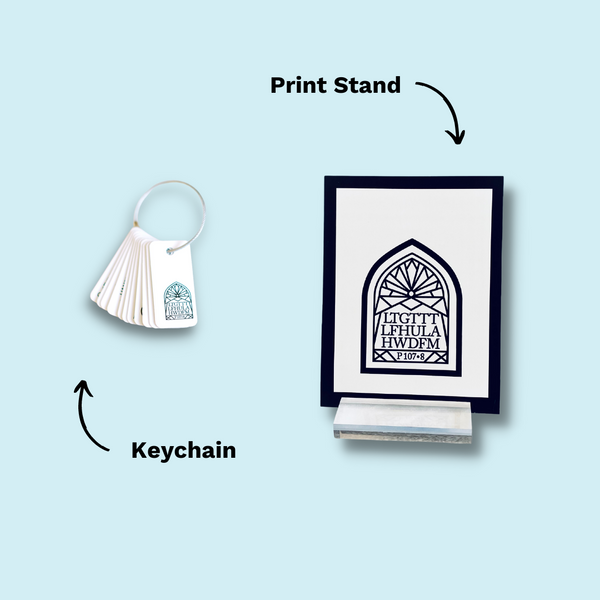"Be joyful in hope, patient in affliction, faithful in prayer." — Romans 12:12
What did 2023 hold for you? What were the highs, lows, unexpected gifts, and surprising sorrows of the last twelve months?
For me, three friends—who all also happened to be young husbands—passed away, two very suddenly and one after a years-long battle with innumerable diagnoses, scans, and torturous treatments. Two more too-young girlfriends received breast cancer diagnoses. One of my daughters got engaged. Another graduated high school and went away to college. My church family fasted and prayed for a miracle and we now bear witness to God granting that miracle in the life of one of our precious babies.
The Lord brought life and death, beauty and sorrow, delight and suffering, and everything in between over the last year. When I think about what 2024 might hold, I get lost in wonder. What will we celebrate? What will we mourn? What will render us speechless? What will we look upon with awe and gratitude?
Our memory verse this month lays a firm foundation for all of us, come what may. Whether we receive unspeakably good news or we are hit with breathtaking grief, this verse will meet us right where we are. It’s always good, right, and useful to “Be joyful in hope, patient in affliction, faithful in prayer” (Romans 12:12).
Not Pithy Advice
Paul wrote these words in his letter to the first-century church at Rome, to believers who lived in a dangerous time and place to be Christ-followers. At best, the first Christians faced being outcasts and rejected by their families and communities, and at worst they were martyred by the powers that be in the Roman Empire. To claim Christ as King was to risk marginalization, imprisonment, torture, and even death.
Both Paul and his first recipients endured hardships likely more extreme than you and I can imagine. So when he tells the Romans to Be joyful in hope, patient in affliction, and faithful in prayer, he’s not saying, Chin up, it’ll be ok, or You got this! This is no pithy advice.
The letter to the Romans is lengthy and rich. Pastors spend years expositing it verse by verse. It helps, then, to know the context of this three-fold command. Chapter 12 begins with the exhortation to “offer your bodies as a living sacrifice” (v. 1). The next paragraph points to the unity and diversity of the Christians who “though many, form one body, and each member belongs to all the others” (v. 5). The third paragraph in the chapter is where we find our verse. Each command in this paragraph is marked by love in action: love sincerely, hate evil, be devoted to one another, honor one another, share with those who have need (v. 9, 10, 13). The chapter concludes with two paragraphs instructing the Roman Christians and all Christians to bless those who persecute us (v. 17), to live at peace (v. 18), to not take revenge (v. 19), and to overcome evil with good (v. 21).
All of chapter 12 calls all Christians to radical sacrifice, forgiveness, and love. Imagining how Paul and his first recipients put these commands to practice under the violent and anti-Christian hand of the early Roman Empire gives me chills. How did they do it? How can we do it? Whether it’s possible imprisonment in ancient Rome, facing a terrible loss today, or even navigating inconveniences or celebrating victories, how can we be joyful in hope, patient in affliction, and faithful in prayer?
In View of God’s Mercy, We Can Do This
This threefold command feels impossible. I trend toward the very opposite: I am more likely to despair in cynicism (rather than to be joyful in hope), be irritated (not patient) in affliction, and clamor for a solution that I can conjure up with my own efforts and actions (before I consider being faithful in prayer). While God’s commands may run counter to our flesh, we can be assured that they are always and only for our good. He is our Maker and our Savior. He is for us.
Paul instructs us to obey these commands, “in view of God’s mercy” (Romans 12:1). When we view God’s mercy, we view the cross. We remember Christ who willingly left the glory and honor of heaven to come down and rescue you and me. We view our Savior—truly God and truly man—who gave himself up for us, trading the payment we deserve for our sins with his righteousness. When we wonder if God is for us, we must only look to the cross. He is merciful beyond measure.
So then, it’s in view of God’s mercy that we can be joyful in hope, patient in affliction, and faithful in prayer. It’s when we remember Christ’s life, death, resurrection, and his coming again, that we can do this. All of Romans 12—really, all of the New Testament and all of God’s Word—is a call to walk in the footsteps of our Savior, which is only possible with his indwelling Spirit within us.
We love because Christ first loved us. We carry our crosses, because Jesus carried his first. We lay ourselves down, because Jesus did so first. It’s in view of his mercy, and by his Spirit, we can obey.
Let’s Keep Coming Back
Friends, life is hard. These commands are hard. Would you spend time with us at Dwell Differently this month as we ponder this threefold command together? Would you consider with us how to respond in practical and tangible ways?
Come back next week to consider what it might look like to be joyful in hope. Come back in two weeks to envision together what it might look like to be patient in our suffering. And finally, meet us here at the end of the month to imagine how we might be faithful to pray the same prayer for years.
Who knows what 2024 will hold? You and I do not, but our God does. Whether we face tremendous highs or horrific lows, our God is for us. He will help us be joyful in hope, patient in affliction, and faithful in prayer. No matter what lies ahead, we can stand secure—in view of his mercy.




